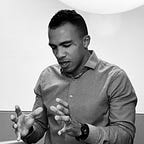Identity Formation & Belonging
Embracing “I don’t know” within identity.
Any day that I get to talk with conscious, self-aware, and massively empathetic people is the best kind of day in my book. I recently had the opportunity to moderate a conversation for Building Belonging, and I wish I could find the words to adequately express the love, intention, hope, and kindness that I felt during this time.
In my work as an identity architect at a small studio I have the distinct privilege of guiding others through the process of searching and accessing their true identity, and during this conversation we discussed the many complexities associated with identity and belonging. Below are some key takeaways from the conversation and it is my hope that along with the full conversation it will help guide you on the lifelong journey of identity formation. Watch the full conversation here.
I am, because I am not
The overarching theme during our conversation was first understanding and embracing the things we are not. The question of “I am…” was quickly deconstructed as each speaker, led by Alok Vaid-Menon, proved they no longer look at themselves or others through this lens. Letting go of the social constructs of what we “should” be, how we should behave, and incorporating those into our identities. In order to embrace who we truly are, we must also embrace and recognize who we are not.
June “Jumakae” Kaewsith said it well, “So much of our suffering is because of our attachment to who it is we think we’re supposed to be.”
Eliminating ego
I am rich.
I am poor.
I am a woman.
I am transgender.
Throughout the resounding disagreement with the status quo understanding of identity formation as human beings, I found trained ideas of what Identity actually is. Our societal upbringing makes it easy to believe that these statements are attached to our identity. Alok dismantled this with the statement “When someone asks me if I am a man or a woman, I tell them no. Because I believe the best answers are the ones that disarticulate the question to begin with.”
Identity is a life long journey. Identity is found only through “burning down previous lives”, said Sandra Kim. Identity can only be revealed by the individual and it is not static. Identity does not begin with “I am”, instead it begins with “I do not know”.
“Sometimes letting things go is an act of far greater power than defending or hanging on.” — Eckhart Tolle
Once you give up and let go of the thoughts of who you are you will begin to ask more questions of yourself. During the conversation I saw a pattern of asking questions rather than making statements. All of the speakers held the humble posture of “I don’t know” but they had a profound understanding of who they are not.
Being truly present
The speakers were completely content with listening to each other speak about their stories I accredit this to their ability to be present in the moment. Rather than thinking about what they should say next, we were present with the flow of the conversation around a complext topic. It is very difficult to script a conversation around identity when it is so personal.
Every speaker on this call has dedicated their life to this work and it was beautiful to see 4 experts, to put it simply, not make it about them. I could tell that when they spoke they spoke authentically and calmly. This peace, this presence made for a beautifully intimate conversation.
Identity is constant
Within the practice of identity architecture, I approach identity as a human-centered praxis that empowers individuals, strengthens communities and reshapes cultural outcomes. This conversation shed light on these perspectives that remain constant through our entire lives.
- Identity is either empowering you or hindering you from being present. I like to say that life is not about finding your purpose but instead living life on purpose right now.
- Identity is either strengthening the community in which you belong or it is weakening it. A community of people is like a puzzle and it is our responsibility to know how we can or can not fit within that puzzle in order to strengthen it.
- Identity is either reshaping cultural outcomes toward inclusivity or exclusivity. Culture is a collective expression of a community of people. In order to reshape cultural outcomes toward inclusivity that collective expression must be an authentic representation of the whole community. If it is not, the reshaped cultural outcomes will lack the representation of a piece of the community. After a few generations cultural outcomes will have excluded part of the community, leading to a fragmented culture.
Reflection
What I appreciated the most about this authentic conversation was the level of honesty with “not knowing”. Each speaker embraced, loved, and found peace in sharing this “not knowing”. They all recognized through personal experience how painful and sometimes crippling it is to build your identity upon faulty ground (social constructs, who you think you should be, who you wish you were). They knew exactly where we will not find our identity, so we spent the whole 90 minutes talking about that.
As we go through life we begin to realize what hurts, what does not fit, and what does not work. In being present to this we are now in a much better position to find what heals, what fits, what works, and most importantly find peace in the present moment. This is the journey of identity formation.
